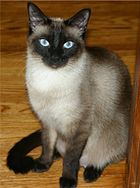
The Siamese Cat (in Thai, วิเชียรมาศ or wichien-maat) is one of the first distinctly recognised breeds of Oriental cat. In Thailand, where they are one of several native breeds, they are called Wichien-maat (a name meaning "Moon diamond"). In the twentieth century the cats became one of the most popular breeds in Europe and North America. The pointed cat known in the West as "Siamese" is one of several breeds of cats from Siam described and illustrated in manuscripts called "Tamra Maew" (Cat Poems), estimated to have been written in the 1700s.
The breed was first seen outside their Asian home in 1884, when the British Counsul-General in Bangkok, Edward Blencowe Gould, brought a breeding pair of the cats, Pho and Mia, back to Britain as a gift for his sister, Lilian Jane Veley (who went on to be co-founder of the Siamese Cat Club in 1901).
All Siamese Cats have a creamy base coat with coloured points on their snouts, ears, paws and lower legs, tails and (in males) scrota. The pointed pattern is a form of partial albinism, resulting from a mutation in tyrosinase, an enzyme involved in melanin production. The mutated enzyme is heat-sensitive; this results in dark colouration in the coolest parts of the cat's body, including the extremities and the face, which is cooled by the passage of air through the sinuses.